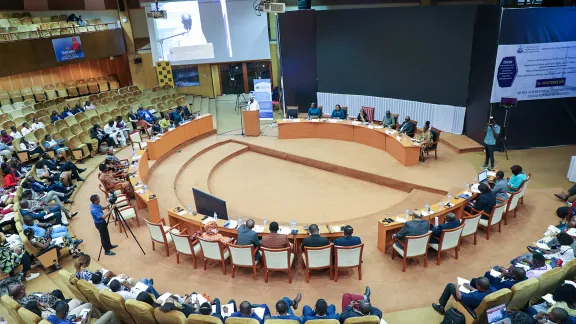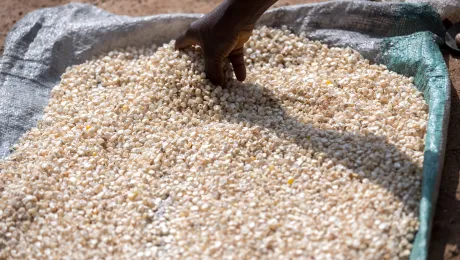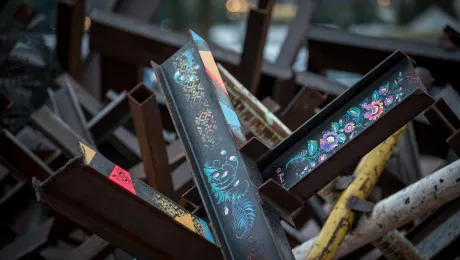At the African Commission on Human and Peoples' Rights, LWF and partners address gender-based violence in the East and Horn of Africa region, emphasizing education and advocacy for a more just society.

Participants gather in Arusha, Tanzania for the 77th Ordinary Session of the African Commission on Human and Peoples' Rights. Photo: LWF/E. K. Adolph
Side Event highlights challenges and progress in the region
(LWI) - The Lutheran World Federation (LWF) held a side event during the 77th Ordinary Session of the African Commission on Human and Peoples' Rights in collaboration with the Evangelical Lutheran Church in Tanzania (ELCT) and the All Africa Conference of Churches (AACC).
The event brought together humanitarian, faith-based, and government actors advocating to further human and people's rights on the African continent. It focused on gender-based violence (GBV) among refugees, host communities, and internally displaced people in the East and Horn of Africa region.
Speakers included the Hon. Maya Sahli-Fadel, African Union Special Rapporteur on refugees, asylum seekers and migrants. Representatives from the Consortium of Ethiopian Human Rights, the Refugee Consortium of Kenya and the Kenya National Commission on Human Rights also participated at the panel.
Special Rapporteur Sahli-Fadel welcomed this opportunity to discuss GBV and the rights of refugees, asylum seekers and migrants, issues that are often examined separately.
"Gender-based violence is a silent pandemic among refugees, hosts, and IDPs in East and Horn of Africa," said Florence Bua, Secretary of the Women affairs Refugee Welfare Council in Uganda. Bua noted that acts of physical, mental, and sexual harm persist. In Uganda, where more than 1.5 million refugees reside, thousands of cases have been reported, predominantly affecting women. Progress has been made through reporting mechanisms and increased involvement, but challenges remain due to cultural norms, poor living conditions, and the lack of safe spaces.
"Empowering refugee women is crucial in addressing gender-based violence” said Sawa Lilly, LWF South Sudan country program officer. “Through economic empowerment, training, safe spaces, and education, they can rebuild their lives. Involving refugee women leaders and strengthening community-based protection structures create awareness and prevent violence. Together, these measures empower refugee women and foster resilience."
Thirty LWF delegates from eight African countries are attending the African Commission on Human and Peoples' Rights which takes place in Arusha, Tanzania, from 20 October to 9 November. The delegation includes staff from LWF World Service Programs, Member Churches and civil society partners who are raising their voices for a stronger protection of human rights in the region.
Member churches emphasize importance of empowerment and education
The LWF and many of its member churches in Africa have a long history of working with refugees, promoting peacebuilding and conflict resolution efforts.
ELCT Presiding Bishop Fredrick Shoo emphasized the importance of educating boys and girls about the importance of respecting women. He encouraged stakeholders to understand that boys need to be engaged in the efforts to overcome gender injustice.
"This session has offered us space to reflect on what is happening and what needs to be done to move forward. We will continue to speak out on fighting GBV until we see it disappear” says LWF Vice-President for Africa and President of the Ethiopian Evangelical Lutheran Church Mekane Yesus Rev Dr. Yonas Yigezu Dibisa. He acknowledged that while the churches have not yet resolved the problem of GBV, their engagement in addressing the issue continues.
Youth representative, David Karangwa, from the Lutheran Church in Rwanda highlighted the power of educating young people about GBV. He emphasized the need for youth in churches to advocate for the well-being of their peers both within and outside of religious communities. “What we learn helps us build engagement in our churches to advocate for the youth within the churches and outside.”
“The event serves as a platform for sharing experiences, concerns, and recommendations to combat GBV among refugees, host communities, and internally displaced people and promote human rights. We are advocating for the implementation of the recommendations generated from the event and bring them to decision makers that are gathering in Arusha.” said Ester Wolf, LWF Senior Advocacy Officer for Human Rights.


